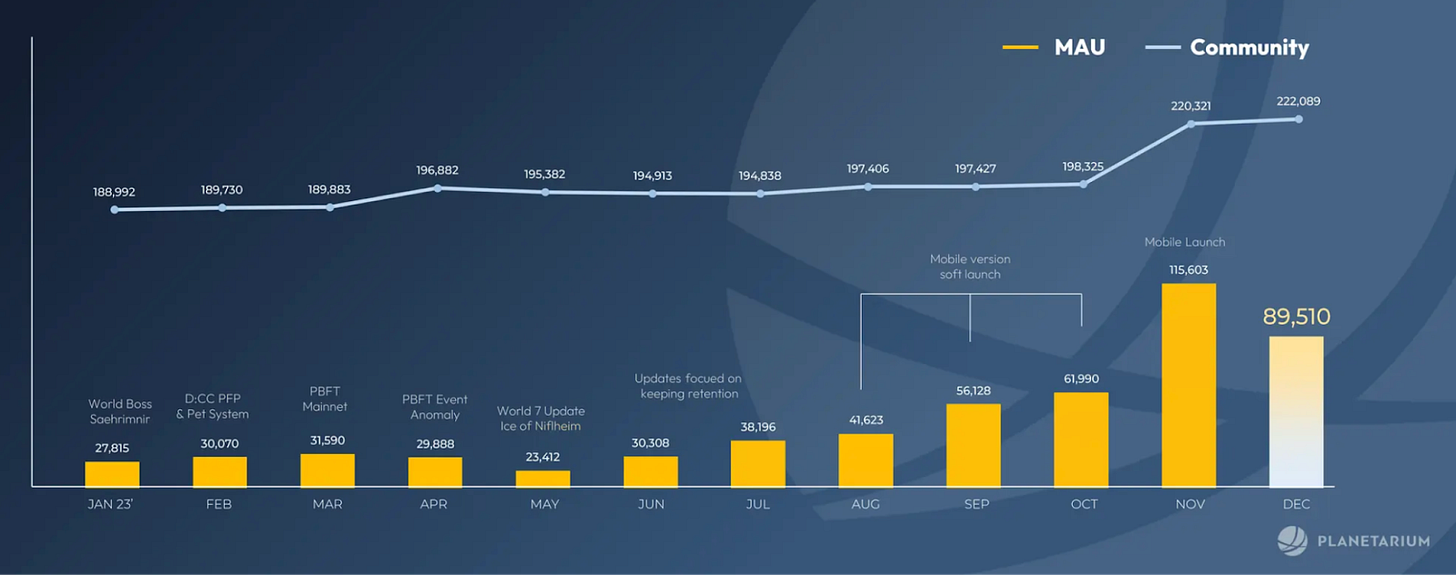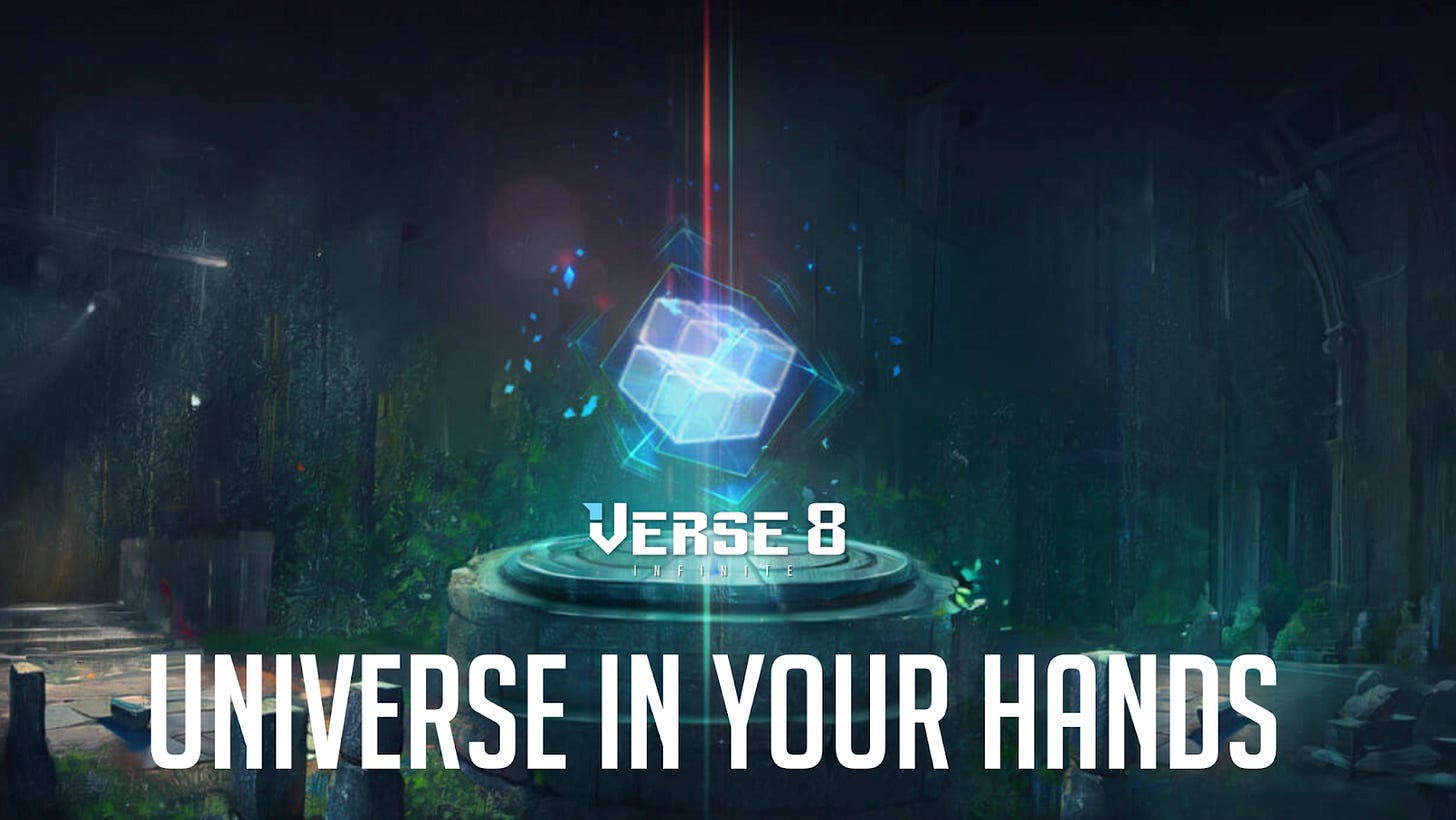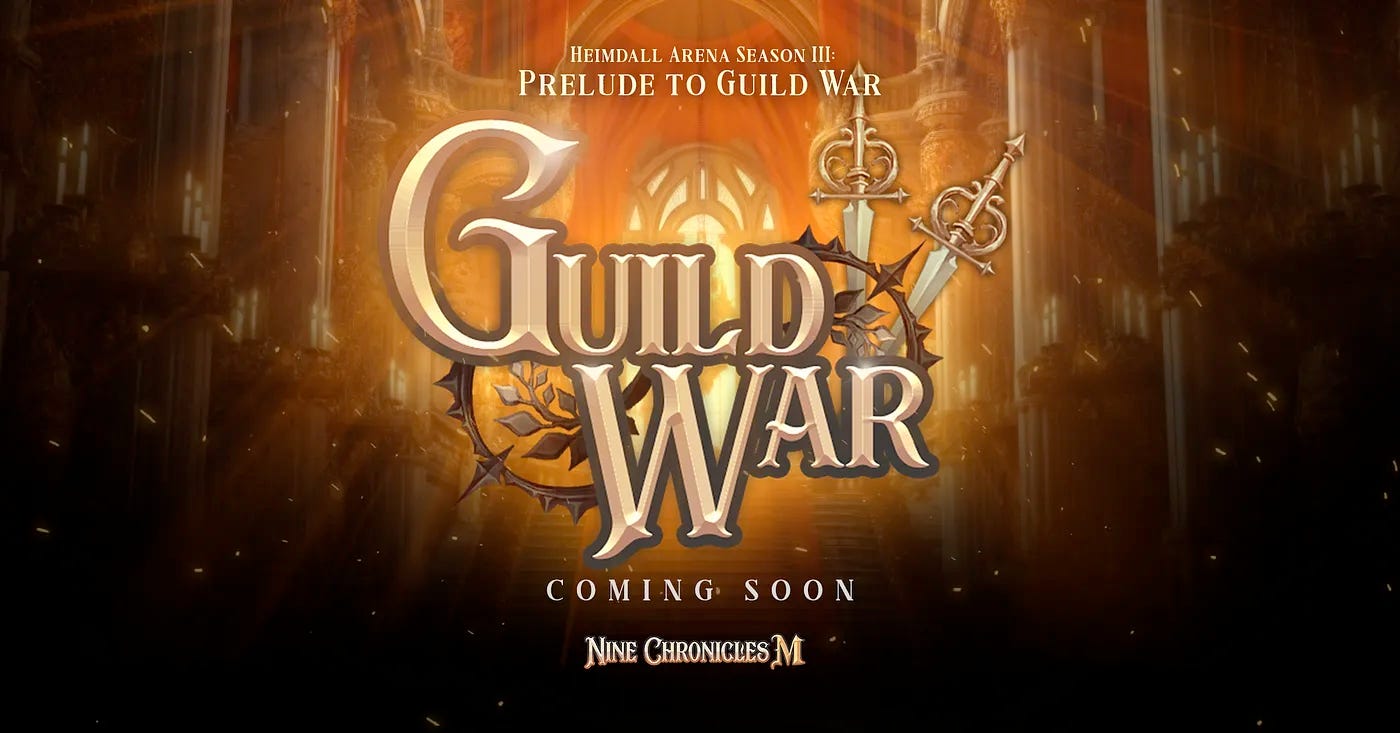Nine Chronicles: Proving the blockchain integration in Web 3 games
Definitely not your everyday idle RPG
What exactly do we mean by Web 3 games? NFT games? Blockchain games? Decentralized games? The definitions can vary, and that is perfectly normal. We are still too early to exactly define these “terms”. This article focuses on the perspective of Planetarium Labs. As a community-driven Web 3 gaming company that launched the game Nine Chronicles in 2020, they are shaping their own definition of Web 3 games.
TL;DR
Nine Chronicles, a Web 3 idle RPG game launched in 2020, has recently released a mobile version. The game has garnered an impressive 200k pre-registrations and secured the top spot on the Google App Store.
The defining aspect of web 3 games lies in their emphasis on decentralization.
Blockchain is not the sole solution for decentralizing a game, but it can certainly contribute to various aspects, particularly in RPG genres.
Planetarium, the team behind Nine Chronicles, utilizes their own engine called LibPlanet. With LibPlanet, they offer serverless and fully open-source gaming, where everything is on-chain.
The nature of idle RPGs allows for the delay in blockchain transactions.
Blockchain usage is effective when used for decentralized governance and collective user decision-making, rather than just tokenizing game elements.
Introduction
"Nine Chronicles," an Idle RPG game, has recently marked impressive achievements in the Web 3 gaming sphere, such as 200k pre-registrations & downloads, ranking #1 in the Google App Store, and reaching an all-time high of 115k monthly active users (MAU).
Launched in 2020, it has been successfully operating for three years. While its impressive performance is commendable, it is also crucial to understand the direction of fully decentralized on-chain Web 3 games that it strives for.
The Essence of Web 3 Games
Web 3 games can take various forms with the integration of blockchain and NFT technologies. It is essential to understand what constitutes a correct definition of a Web 3 game.
The key to comprehending the ethos of Web 3 games lies in the motive for decentralization. In fact, achieving a significant level of decentralization is possible even without blockchain technology, merely through open-source software.
Nevertheless, by incorporating blockchain, a more profound level of decentralization is made possible, encompassing the operational aspects of the gaming world. Blockchain technology enables secure and decentralized governance based on P2P networks.
Many Web 3 games in various genres merely tokenize weak economics and issue in-game items as NFTs, claiming themselves to be decentralized. However, these games often operate in a highly centralized manner, with their NFTs traded on centralized exchanges. It is important to note that NFT items are not always permanent; if the game shuts down and the company stops supporting the NFTs, they become mere data claiming ownership. From a user experience (UX) perspective, the benefits of these features are minimal.
Decentralization in Role Playing Games
The need for decentralization in most genres may not be immediately apparent. However, for RPG users, it can effectively address the thirst experienced by players. Here are some of the challenges that RPG players often face:
1. Loss of Invested Resources: When a developer shuts down servers for any reason, users' invested resources become worthless.
2. Limitations on Secondary Creation: Due to the existence of a central server, it is challenging for players to become creators within the game's universe.
3. Lack of Transparency in Game Operations: Non-disclosure of item drop logic and other operational aspects leads to a decline in trust between developers and players.
Nine Chronicles and Its Approach
Nine Chronicles, which has been consistently maintaining 20k daily active users (DAU) for three years, is an Idle RPG aiming to be a fully decentralized game. Developed by Planetarium, it utilizes a blockchain game engine called LibPlanet to overcome the challenges faced by Web 2 games.
Key Features of LibPlanet
Serverless Gaming: Games made with LibPlanet are persistent. Even if the company closes, the game continues to exist, operated by the players themselves as nodes, ensuring data integrity and immutability.
Fully Open Source: Planetarium Labs emphasizes the importance of user maps and mods, encouraging creative secondary creation activities. Unlike modern MMOs, games without central servers historically supported active modding. Therefore, by making the game engine open source, players are encouraged to actively develop their own clients and collaboratively expand the game's universe. There have been cases where forked alternative clients have gained popularity over the official ones.
The game design intentionally leaves space for creative input in the universe. For instance, there is no restriction against users opting for a superior user-made client over the official one. Currently, only LibPlanet is open-sourced, but there's a possibility that the source code of Nine Chronicles itself might also be converted to open source in the future.
On-Chain perks in Nine Chronicles
The primary challenge that on-chain games encounter when trying to attract users is the speed of transactions during gameplay. Like other on-chain games, all activities in Nine Chronicles are recorded on the blockchain, whether crafting items, clearing stages, or dueling in the arena.
The Idle RPG genre suits this structure well since the pace of the game is not fast, and it does not require constant attention from the player. The delay in transmitting information to the blockchain, a significant inconvenience in fully on-chain games, is less noticeable here due to the nature of the gameplay.
The game adheres to the Idle RPG formula of “clear stages to collect materials, use these materials to craft/enhance items, and then compete in the arena for rewards.” This approach effectively manages the user's attention span, continuously engaging them in the game.
Conclusion
Not every game needs blockchain as a means of decentralization. If a blockchain-based system relies heavily on trust towards a specific entity, it's less effective than traditional methods due to its technical constraints and complexity. In this context, Planetarium's approach with Nine Chronicles, using blockchain for decentralized governance and allowing users to collectively decide the direction of the game, appears to be a clear and effective strategy.
Next week, SKYGG will cover all information a new player needs to know to to prepare himself for the upcoming Season 3 of Nine Chronicles.
Researcher’s note
The primary issue with many Web3 game companies is their lack of a strong thesis on why their games require blockchain technology and why they should adopt the Web3 route. While the hype and pump surrounding games and gameplay designs similar to Web2 games are all part of the Web3 gaming ecosystem, ultimately, it is pivotal to understand what matters is the fundamentals of the Web3 game they are building.
Although the token value of Nine Chronicles has significantly dropped from its all-time high, the influence of the gaming world and community Planetarium Labs are building will be considerable as long as they hold on to their unique vision.
On a more personal note, I believe Nine Chronicles is a game that Planetarium Labs is using as a proof of concept, preparing to incorporate their vision into their next game. Yes, Planetarium is racing to launch two more games in 2024.
One of them is Verse 8, a roguelike RPG game involving Jake Song, who developed prominent Korean MMORPGs such as Lineage and Archeage. Additionally, Immortal Rising 2 is scheduled for release, which integrates Web3 elements into the already successful game IP, Immortal Rising. The sleeping giant is about to make its move, and I would not underestimate it.
SKYGG and YGG have joined forces to introduce the Guild system for Nine Chronicles. In this game, guilds go beyond being mere validator systems. They are decentralized communities that operate validators/nodes for gamers while also sharing incentives with their members and the wider ecosystem. We are thrilled to lead the way in decentralized gaming. As Nine Chronicles has recently introduced the concept of Guild Wars, follow SKYGG and stay tuned as we embark on an exciting journey through the realms of Nine Chronicles with the "Guild of Guilds."
Disclaimer: SKYGG and the core contributors are investors and advisors to Nine Chronicles. Any projections, estimates, forecasts, targets, prospects, and/or opinions expressed in this blog are subject to change without notice and may differ or be contrary to opinions expressed by others. The content is provided for informational purposes only, and should not be relied upon as the basis for an investment decision, and is not, and should not be assumed to be, complete.







